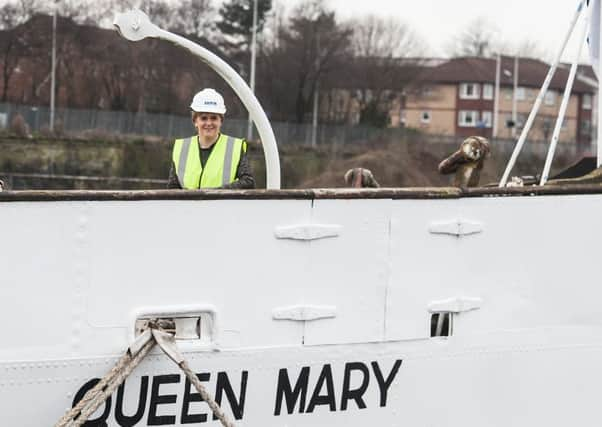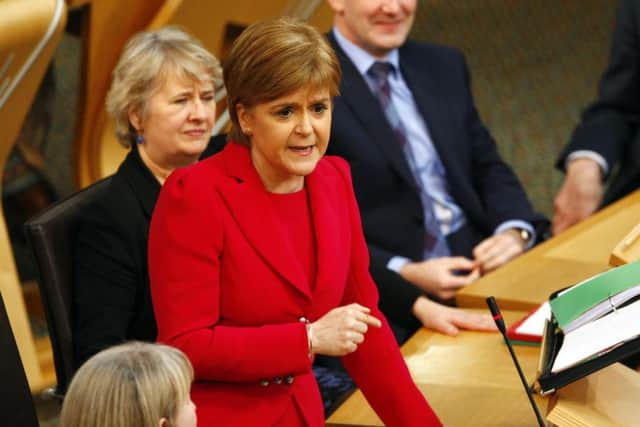Bill Jamieson: Sturgeon setting sail without a rising tide


Wars can be won or lost, not by the movements of big battalions but by small platoons. It is advice to which Scotland as a whole now needs to take heed – and First Minister Nicola Sturgeon in particular.
Truly, no more telling a barometer of our prospects is the mood across the smaller business sector. It is the enterprise spirit of these businesses, their risk-taking and positivity on which we depend to drive our economy and lift our fortunes.


Advertisement
Hide AdAdvertisement
Hide AdThe bald statistics barely begin to cover it. We have some 348,000 small and medium-sized enterprises (SMEs) providing an estimated 1.2 million jobs. They account for almost 55 per cent of private sector employment and 40 per cent of private sector turnover.
From café bars to garden supplies, plumbers to brand consultants, B&Bs to taxi drivers, shopkeepers to IT fixers, they are the vital lifeblood of our communities.
So in any prospective change in government policy and the constitution, the impact on our small firms matters greatly. And on few issues does it matter more than the current row over a second independence referendum.
During the 2013 referendum campaign the SNP made much of its support within the SME sector. Its Business for Scotland lobby group claimed “to being perhaps the best funded, supported, resourced and most effective associated group in the independence campaign”. And today it boasts more than 4,000 “associate and stakeholder members”.


So it is pertinent to note what their views are about the current controversy over ‘indyref 2’.
The accountants French Duncan – one of the largest mid-tier accountancy practices in Scotland – carried out an opinion survey last week to find out the views of Scottish SMEs today. The firm was besieged with 800 replies almost immediately, and given the speed and volume of responses had to cut off the survey after 24 hours.
The firm makes no claims to this being a professional survey or weighted sample so it’s perhaps best to treat these results as anecdotal. “We are under no illusion,” says the firm, “that this was not a scientific survey, but we thought that it would be an interesting snapshot of business’s opinion given that the vast majority of people on our database either work in SMEs or their clients/customers are SMEs.”
Nevertheless, the immediacy of response and the numbers would seem to leave little doubt as to the strength of feeling on this issue.
Advertisement
Hide AdAdvertisement
Hide AdTo describe the results as challenging for the SNP would be an under-statement. This is what the survey found:
A total of 89 per cent of respondents were opposed to a second referendum and 87 per cent believed they would be worse off under independence. An almost equal percentage – 85 per cent – said the economy would be likely to grow more slowly on independence and 92 per cent believed tax would rise.
Just 11 per cent believed an independent Scotland would be more attractive to inward investment while more than three quarters (76.4 per cent) said it would be less attractive.
As for their opinion as business people about the financial prospects of an independent Scotland, 5.2 per cent responded that they were “delighted” about the financial prospect while 62 per cent described their reaction as “terrified”.
French Duncan partner Graeme Finnie stresses that they are not pollsters and that the results should be regarded as little more than a snapshot of opinion. Nevertheless, “while we were not surprised at the general trend of opinion, we were surprised at the quantum”.
What’s also clear is that SME misgivings about another independence are less to do with considerations over timing than the bigger question of the economic prospectus that independence campaigners could offer a second time around.
These concerns are strongly amplified by the latest Fraser of Allander analysis this week. Over the ten years since the start of the financial crisis in 2007, it points out, the Scottish economy has grown by under seven per cent – equivalent to an average annual growth rate of just 0.7 per cent – less than a third of its long-term trend.
GDP per head is just 2 per cent higher over the same ten-year period and the incomes of many households remain worse off.
Advertisement
Hide AdAdvertisement
Hide AdNext month’s statistics are likely to confirm that the Scottish economy grew by just 1 per cent last year. With growth of 1.2 per cent in 2015, the Scottish economy has now been stuck in a low-growth cycle for nearly two years. The FoA’s central forecast now is for pallid growth of just 1.2 per cent this year, 1.3 per cent next and 1.4 per cent in 2019.
“Strategies, action plans and ambitions around inclusive growth will only take us so far. What really matters are clear practical policy actions to support businesses, boost productivity, attract investment and create jobs. A renewed focus on how both the Scottish and UK governments can use the current powers at their disposal to support the Scottish economy is needed.”
Of particular concern is the lacklustre performance of the service sector relative to the UK – and it is here where many SMEs are to be found. The growth that does exist in the Scottish economy has been coming through services, making up around 75 per cent of the total economy. The sector has grown in each and every quarter since mid-2015, helped by a continued robust uptick in consumer spending and a sharp rise in financial and insurance activities. But it has notably lagged the UK. Over the year as a whole, UK services are up 3.1 per cent compared to growth of 2.1 per cent in Scotland.
While there has been a slightly more positive sentiment within the business community of late, levels of consumer confidence in Scotland have continued to slide. The GfK Consumer Confidence Index fell to minus 18 in February – well below the same index in the UK (which whilst also negative was - 6).
One possible explanation is the sharp fall in the expectations that households have for the economy in the foreseeable future. The Scottish Government’s own consumer confidence index points to a sharp weakening in expectations about the economy. “Given the scale of household spending in the economy,” says the FoA, “this loss in confidence does not bode well for future growth in Scotland.”
What a challenge we now face – and one which all the uncertainties of a second independence referendum have greatly intensified. Any credible prospects for a second referendum critically hinge not on the battle over the timing of such a vote, but what exactly an independence prospectus could offer to lift us out of the doldrums.
As matters stand, the First Minister has been pressing for a vote and to set sail whether or not there is a rising tide. The Fraser of Allander outlook – and that anecdotal survey of SME opinion – suggest the winds are far from clement.
